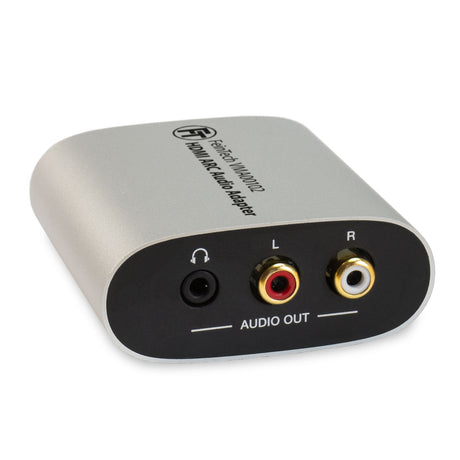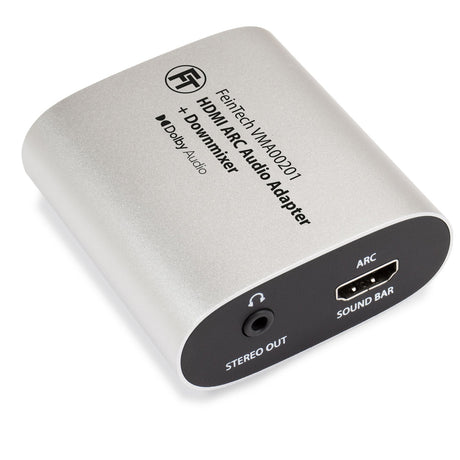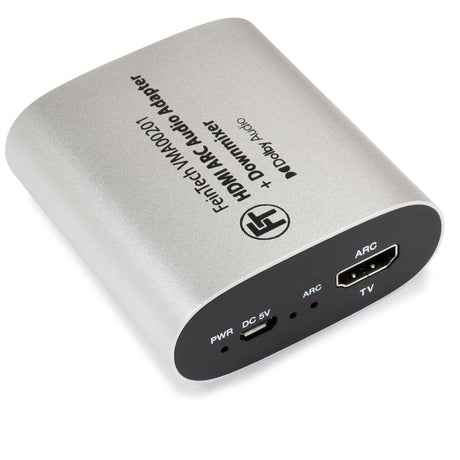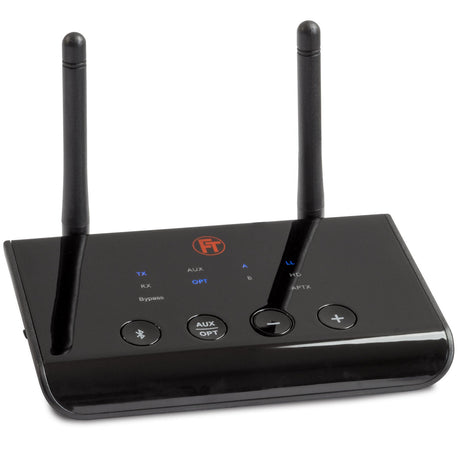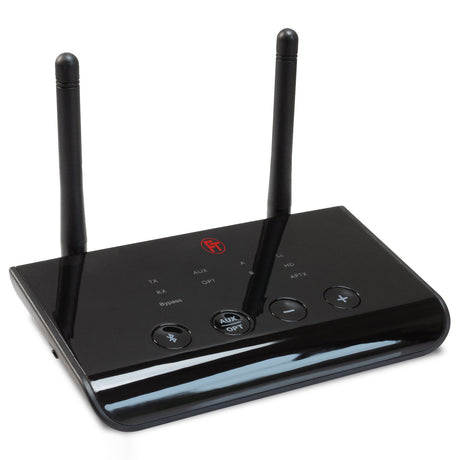A common question we receive in our customer service department: "How do I connect headphones and a sound system to my TV via HDMI?" Few TVs deliver sound through multiple connections simultaneously . If the TV even has a headphone jack, the other outputs are muted when connected.
That's why we've developed a solution for HDMI-ARC. Actually, two different solutions. One version for a stereo system, another for a surround system. But first things first...
Every new TV now has an HDMI-ARC port or the latest version, HDMI-eARC. ARC or eARC stands for Audio Return Channel. The "e" in eARC stands for "enhanced" and is part of the HDMI 2.1 standard. This eliminates the need for analog interfaces for headphones, powered speakers, or stereo systems on new TVs. With our new adapters, you can use HDMI-ARC to connect a stereo sound system via RCA and/or jack plugs. Most TVs have just a single ARC/eARC port, which is used to deliver sound from cable or satellite TV, apps, and connected players. This usually mutes all other audio outputs and the internal speakers. This would result in the sound being out of sync, resulting in echo or reverberation.

HDMI- eARC connection to a TV (top right) – this HDMI socket looks the same as the other HDMI inputs, but can also output audio.
Our adapter delivers digital HDMI-ARC TV audio. The audio signal is converted to analog and output via RCA or 3.5 mm jack.
HDMI-ARC audio adapter for stereo devices
In the simple version VMA00102 the conversion only in stereo possible – not Dolby Digital or other multi-channel formats. Therefore, the audio format “PCM” / “LPCM stereo” must be set on the television. With “Bitstream” or multi-channel PCM, the adapter does not produce any sound. Every television has a setting for this. You can also hear the sound of other devices connected to the television via HDMI through the adapter. If you have a satellite or Sky receiver, please set the sound to stereo, not to AC3 or Dolby Digital. You can even control the volume using the TV remote control. The adapter uses the HDMI-CEC protocol for this. Control commands from the TV remote control are sent to the adapter via HDMI and change the volume there.

The TV delivers the audio signal via HDMI-ARC, and the VMA00102 adapter converts it for headphones and stereo systems. Note that adjusting the volume on audio devices will also change.
HDMI-ARC adapter for headphones and soundbar – with ARC pass, Dolby Digital decoder and downmixer
We also offer an enhanced version with the model number VMA00201 . This headphone adapter can be used with a soundbar (or AV receiver). The adapter receives the audio signal from the TV via HDMI-ARC and forwards it to the soundbar. The soundbar behaves exactly as if connected directly. It plays the audio formats stereo, Dolby Digital, and DTS. Higher audio formats are not supported. At the same time, the adapter outputs the sound via the headphone jack. The adapter decodes multi-channel sound and downmixes it to stereo. This allows the soundbar to output the audio signal. Multi-channel sound Stereo is possible via both outputs and headphones. This can also be done simultaneously via both sound systems. The soundbar does not need to be connected. The TV remote controls the volume for both outputs, i.e., for headphones and soundbar.
The logic is as follows:
- If only the soundbar is connected, the TV remote control controls its volume
- If only the headphones (or stereo speakers) are connected, the TV remote control controls the volume.
- When headphones and the soundbar are connected, the TV remote controls the soundbar volume. The headphone jack remains at maximum volume.
- The last volume setting is saved and used the next time the device is switched on.

HDMI ARC adapter with Dolby Digital decoder and passthrough to the soundbar
How to connect and operate the VMA00201
The HDMI-ARC adapter is powered via USB, e.g., from a USB port on the TV. There's no need to manually turn it on. Incidentally, the HDMI-ARC adapter can also be powered via an HDMI-eARC port on the TV. eARC is backward compatible.

The adapter delivers a stereo signal via the jack output, even with Dolby Digital. The soundbar behaves exactly as if connected directly, delivering multi-channel audio at the same time. The only drawback: with certain device combinations, the soundbar must be turned on manually.
The analog audio output delivers a standard-compliant audio level of 2 V rms. This can be used to power hearing amplifiers or audio transmitters for Bluetooth, wireless, or infrared headphones. These days, few people want to use wired headphones. The output level is therefore no higher than with other devices. For hearing-impaired people who want to connect headphones directly via cable, the audio level of the output without an amplifier may be too low. In this case, we recommend connecting a Bluetooth audio transmitter (e.g., ABT00102) or a suitable hearing amplifier for hearing aids to the VMA00201.
Tip: Due to this wireless transmission, the sound isn't exactly synchronized with the soundbar. Therefore, your headphones should be closed as much as possible to avoid echo. It's best if the headphones and wireless transmitter operate with low latency. This works best if both support the aptX standard via Bluetooth, or if the base station and headphones operate via infrared or 2.4 GHz wireless.
| VMA00102 | VMA00201 | |
| Audio input | HDMI ARC | HDMI ARC |
| Audio outputs | 3.5 mm jack, RCA stereo | 3.5 mm jack, HDMI ARC |
| Audio formats | PCM stereo | PCM stereo, Dolby Digital, DTS |
| Output frequency | 20 – 20,000 Hz | 20 – 20,000 Hz |
| Output level (analog) | 2 V rms | 2 V rms |
| SNR | > 90 dB | > 90 dB |
| Crosstalk | > 80 dB | > 80 dB |
| Total harmonic distortion THD | <0.1% (V max ), 0.001-0.01% (V best ) | <0.1% (V max ), 0.001-0.01% (V best ) |
| Power supply | USB 5 V DC | USB 5 V DC |
| Power consumption (maximum) | 172 mA | 310 mA |


